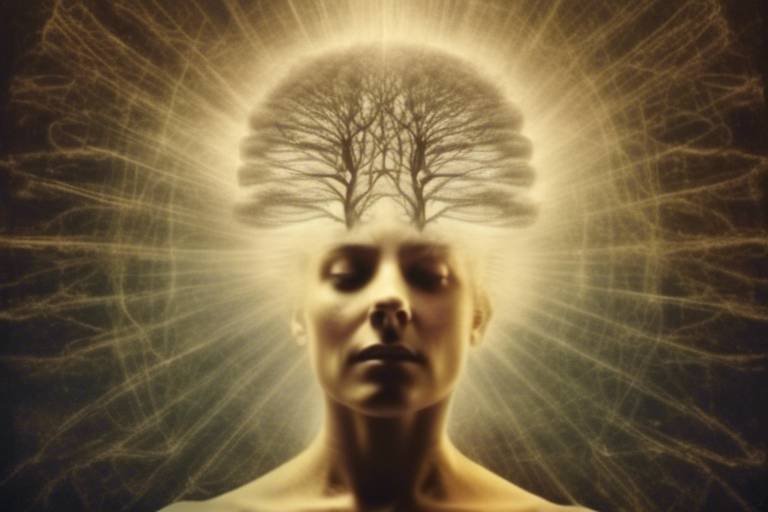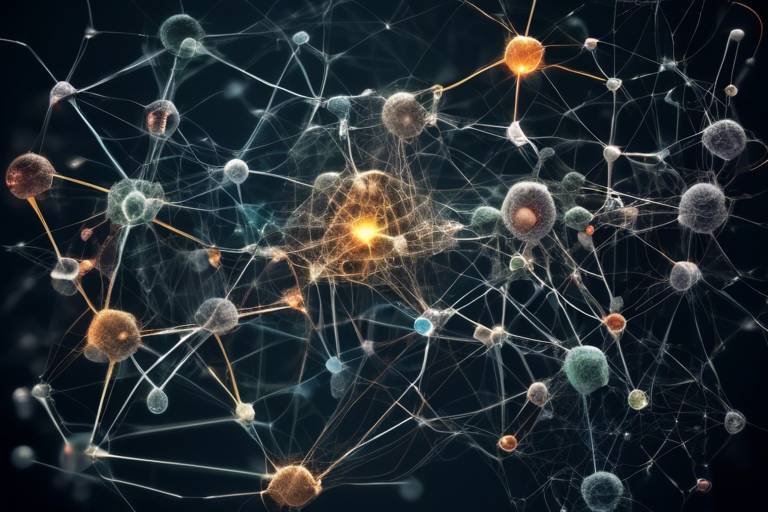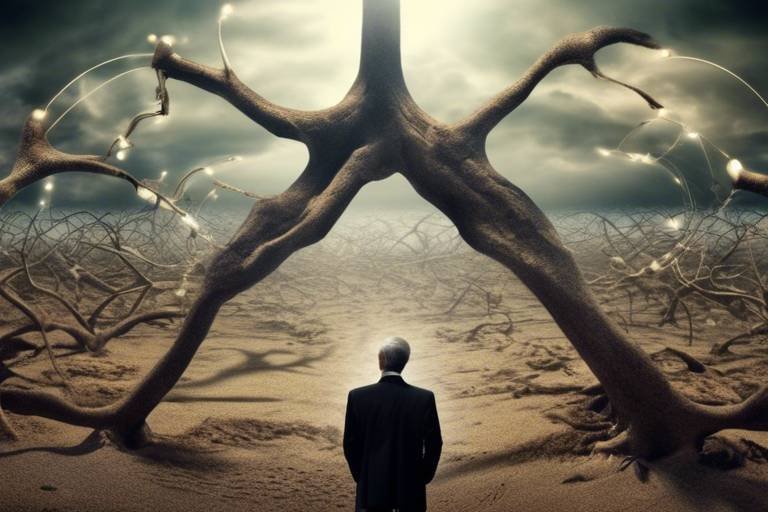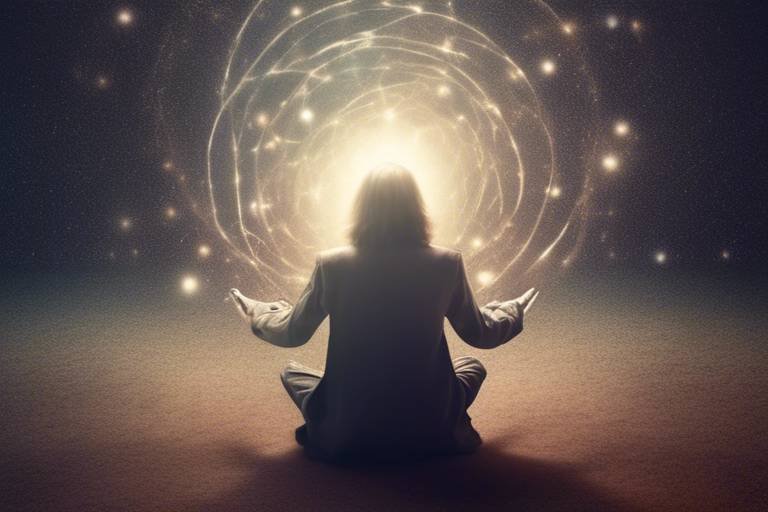Metaphysical Study of the Nature and Potential of Consciousness
The exploration of consciousness is akin to embarking on a journey through the vast, uncharted waters of existence. It’s a subject that has puzzled philosophers, scientists, and spiritual seekers alike for centuries. What does it mean to be conscious? Is consciousness merely a byproduct of brain activity, or does it represent something more profound and mysterious? In this article, we will dive deep into the intricate relationship between consciousness, reality, and existence, illuminating various metaphysical perspectives and theories that expand our understanding of consciousness and its incredible potential.
At its core, consciousness is often defined as the state of being aware of and able to think about one’s own existence, thoughts, and surroundings. But what does this really entail? Philosophers have long debated the fundamental nature of consciousness, proposing various interpretations that shape our understanding. Some argue that consciousness is a fundamental aspect of the universe, akin to space and time, while others suggest it emerges from complex neurological processes. This dichotomy raises an intriguing question: is consciousness something we possess, or is it something we are? This existential inquiry invites us to reconsider our place in the universe and the nature of reality itself.
Throughout history, different cultures and philosophies have approached the concept of consciousness from unique angles, each contributing to the rich tapestry of metaphysical discourse. From the ancient Greeks to modern thinkers, the evolution of thought surrounding consciousness reflects our growing curiosity and understanding of the human experience. Key philosophers like Descartes with his famous declaration, "I think, therefore I am," and Hume, who questioned the self, have profoundly influenced our contemporary views. Their contributions, alongside those of other thinkers, form a foundation upon which we can build our understanding of consciousness today.
Eastern philosophies, particularly Buddhism and Hinduism, offer rich insights into the nature of consciousness. In these traditions, consciousness is often viewed as a fundamental aspect of the universe, interconnected with all living beings. The concept of mindfulness emerges as a vital practice in these cultures, emphasizing the importance of present-moment awareness. This practice not only enhances consciousness but also fosters a deeper connection with oneself and the surrounding world. By cultivating mindfulness, individuals can unlock the profound potential of their consciousness, leading to personal and spiritual development.
Mindfulness is more than just a buzzword; it’s a transformative practice that encourages individuals to engage fully with the present moment. By focusing on the here and now, we can develop a heightened sense of awareness that allows us to observe our thoughts and feelings without judgment. This practice can serve as a gateway to deeper states of consciousness, enabling a clearer understanding of our place in the universe. Imagine standing on the shore, watching the waves roll in. Each wave represents a thought, and by practicing mindfulness, we learn to observe these waves without getting swept away.
Another fascinating aspect of Eastern thought is the principle of non-duality, which posits that consciousness transcends individual perception. Instead of viewing ourselves as separate entities, non-duality suggests that we are part of a unified whole. This perspective can be both liberating and challenging, as it invites us to reconsider the boundaries we often place around our identities. Embracing non-duality can lead to a profound experience of interconnectedness, where the distinction between self and other begins to dissolve.
In contrast, Western philosophical traditions have often grappled with the nature of consciousness through lenses like Cartesian dualism and materialism. Cartesian dualism, famously articulated by Descartes, posits a clear distinction between the mind and body. This view has led to ongoing debates about the relationship between mental states and physical processes. On the other hand, materialism argues that consciousness arises solely from physical interactions within the brain, dismissing any metaphysical implications. These competing perspectives shape our contemporary understanding of consciousness and reality, highlighting the complexity of this enigmatic phenomenon.
As we delve into the scientific realm, the investigation of consciousness takes on a new dimension. Neuroscience and psychology offer valuable insights into the biological and psychological underpinnings of conscious experience. By examining brain activity and its correlation with conscious thought, scientists are beginning to unravel the mysteries of how we perceive and interact with the world around us.
Neuroscience plays a crucial role in understanding consciousness by exploring the brain's intricate workings. Through advanced imaging techniques, researchers can observe brain activity in real-time, revealing how different regions contribute to conscious experience. For instance, studies have shown that specific patterns of neural activity correlate with various states of consciousness, from wakefulness to deep sleep. This growing body of research suggests that consciousness is not merely a passive experience but an active process shaped by our biological makeup.
In addition to neuroscience, psychological theories provide a framework for understanding consciousness from a subjective standpoint. Cognitive psychology, for example, examines how we process information and form perceptions of reality. This field emphasizes the importance of subjective experience, suggesting that our consciousness is shaped by our thoughts, emotions, and memories. By exploring these dimensions, we can begin to appreciate the rich tapestry of consciousness and its potential to influence our lives.
- What is consciousness? Consciousness is the state of being aware of and able to think about one's own existence, thoughts, and surroundings.
- How do Eastern philosophies view consciousness? Eastern philosophies often see consciousness as interconnected and emphasize practices like mindfulness to enhance awareness.
- What role does neuroscience play in understanding consciousness? Neuroscience investigates the biological basis of consciousness by studying brain activity and its correlation with conscious experience.
- What is non-duality? Non-duality is a concept that suggests consciousness transcends individual perception, leading to a unified experience of existence.

The Essence of Consciousness
When we dive into the depths of consciousness, we find ourselves grappling with a concept that is as elusive as it is profound. What exactly is consciousness? Is it merely a byproduct of brain activity, or is it something more? At its core, consciousness can be defined as the state of being aware of and able to think about one’s own existence, thoughts, and surroundings. This awareness is not just a passive experience; it is an active engagement with reality that shapes our perceptions and interactions.
Philosophers have long debated the fundamental nature of consciousness. Some argue that it is a fundamental aspect of the universe, akin to space and time, while others view it as an emergent property of complex biological systems. To illustrate, consider the analogy of a computer: while the hardware (the brain) is essential, it is the software (the mind) that truly brings it to life. This distinction highlights the ongoing conversation about whether consciousness is simply a function of physical processes or if it transcends them.
Moreover, consciousness is often described in layers, akin to the peeling of an onion. At the surface, we have our immediate awareness—what we see, hear, and feel in the present moment. As we delve deeper, we encounter our subconscious, where memories, emotions, and instincts reside. Finally, at the core, we may find what some refer to as the “true self” or the essence of our being. This multi-layered understanding of consciousness invites us to explore not just the “what” of consciousness, but the “why” and “how” as well.
In metaphysical discussions, consciousness is frequently associated with the concept of reality itself. Some theorists propose that consciousness is not just a mirror reflecting reality but a creative force that shapes it. This perspective leads us to ponder: are we merely observers of the universe, or do our thoughts and beliefs actively participate in its unfolding? Such questions challenge our conventional understanding and encourage us to consider the interconnectedness of all existence.
Ultimately, the essence of consciousness remains a tantalizing mystery, a puzzle that invites exploration from both philosophical and scientific perspectives. As we continue to study the nature of consciousness, we may uncover insights that not only enhance our understanding of ourselves but also reveal our place in the cosmos. In this journey, we find that consciousness is not just about awareness; it is about connection, creation, and the potential for transformation.
- What is consciousness? Consciousness refers to the state of being aware of and able to think about one's own existence, thoughts, and surroundings.
- Is consciousness purely a product of the brain? There are differing views; some see it as an emergent property of complex biological systems, while others argue it may be a fundamental aspect of the universe.
- How does consciousness relate to reality? Some theorists suggest that consciousness not only observes reality but also actively shapes it through our thoughts and beliefs.

Historical Perspectives on Consciousness
The exploration of consciousness is not a modern endeavor; it stretches back through the annals of human thought, revealing a rich tapestry woven by diverse cultures and philosophies. From ancient civilizations to contemporary thinkers, the quest to understand what it means to be conscious has spurred countless debates and insights. It’s fascinating to consider how different eras and societies have approached this profound topic, each adding layers of complexity to our understanding. Imagine consciousness as a vast ocean, with each culture contributing its own unique wave, creating a dynamic and ever-evolving landscape of thought.
In ancient Greece, philosophers like Plato and Aristotle laid foundational ideas about consciousness. Plato, through his theory of forms, suggested that the material world is only a shadow of the true reality, which resides in a realm of ideas. This notion implies that consciousness is not merely a byproduct of physical existence but a connection to a higher truth. Aristotle, on the other hand, emphasized empirical observation, proposing that consciousness is tied to the essence of living beings. His view initiated a more scientific approach to understanding the mind, paving the way for future inquiries.
As we journey through history, we encounter the rich traditions of the East. In Eastern philosophies, particularly within Buddhism and Hinduism, consciousness is often viewed not as a separate entity but as an integral part of the universe. For instance, Buddhist teachings emphasize the concept of mindfulness, encouraging individuals to cultivate awareness of their thoughts and surroundings. This practice is seen as a pathway to enlightenment, where one realizes the interconnectedness of all existence—a stark contrast to the often individualistic perspectives found in Western thought.
Eastern philosophies delve deep into the nature of consciousness, emphasizing its fluidity and interconnectedness. The idea of non-duality is particularly significant, suggesting that the distinction between self and other is an illusion. This perspective invites individuals to transcend their limited perceptions and recognize a unified experience of existence. The teachings of Advaita Vedanta in Hinduism echo this sentiment, positing that the individual self (Atman) is ultimately one with the universal consciousness (Brahman). Such views challenge the conventional understanding of consciousness as a mere byproduct of brain activity, urging us to explore the deeper, more mystical aspects of existence.
The practice of mindfulness is a cornerstone of many Eastern traditions, acting as a bridge to enhance consciousness and awareness. By focusing on the present moment, individuals can cultivate a deeper understanding of their thoughts and emotions. This practice not only fosters personal growth but also encourages a spiritual awakening, allowing one to experience life more fully. Think of mindfulness as tuning a radio; when the dial is adjusted, static fades away, and clarity emerges. This clarity is essential for navigating the complexities of human experience and understanding the nature of consciousness itself.
Non-duality challenges our conventional perceptions by suggesting that the separation we often feel between ourselves and the world is an illusion. In this view, consciousness is not confined to individual minds but is a universal phenomenon that connects all beings. This perspective can be both liberating and daunting. Imagine standing on the edge of a vast cliff, looking out over an endless ocean. The horizon blurs, and for a moment, you lose the sense of your individual self, feeling instead part of something much greater. This is the essence of non-duality—a profound realization that consciousness transcends individual experience.
Shifting gears to the Western world, we find a contrasting approach to consciousness. Thinkers like René Descartes introduced the concept of dualism, positing a clear distinction between the mind and body. This Cartesian perspective laid the groundwork for modern philosophy but also sparked debates about the nature of consciousness. Is it merely a function of the brain, or does it exist independently? Materialism emerged as a counterpoint, suggesting that all phenomena, including consciousness, can be explained through physical processes. This ongoing dialogue between dualism and materialism continues to shape contemporary discussions on consciousness, illustrating the complexity of this enigmatic subject.
In conclusion, the historical perspectives on consciousness reveal a rich interplay of ideas across cultures and time periods. From the philosophical musings of ancient Greece to the spiritual insights of the East, and the analytical approaches in the West, each perspective contributes to a broader understanding of consciousness. As we continue to explore this intricate relationship between consciousness and reality, we are reminded that the journey is just as important as the destination.
- What is consciousness? Consciousness refers to the state of being aware of and able to think about one's own existence, thoughts, and surroundings.
- How do Eastern philosophies view consciousness? Eastern philosophies often see consciousness as interconnected and non-dual, emphasizing mindfulness and the illusion of separation.
- What are the main Western philosophical approaches to consciousness? Western philosophies include Cartesian dualism, which separates mind and body, and materialism, which views consciousness as a product of physical processes.

Eastern Philosophical Views
When we dive into the depths of Eastern philosophies, we find a treasure trove of insights regarding consciousness that often stand in stark contrast to Western thought. In traditions such as Buddhism and Hinduism, consciousness is not merely a byproduct of brain activity; instead, it is viewed as a fundamental aspect of existence itself. These philosophies invite us to reconsider our understanding of consciousness, urging us to explore its potential beyond the confines of individual perception.
At the heart of Eastern thought lies the concept of mindfulness. This practice encourages individuals to cultivate a heightened state of awareness, allowing them to experience the present moment fully. Mindfulness is not just a technique; it’s a way of life that fosters a deeper connection to one’s own consciousness and the surrounding world. Imagine standing by a river, feeling the cool breeze, and listening to the gentle flow of water. This moment of presence is what mindfulness seeks to nurture, helping us realize that consciousness is not a static state but a dynamic, ever-evolving experience.
Additionally, the notion of non-duality plays a crucial role in Eastern philosophies. It posits that consciousness transcends the individual self, leading to a profound understanding of interconnectedness. In this view, the boundaries that separate “you” from “me” dissolve, revealing a unified experience of existence. This idea can be likened to a vast ocean where each wave represents an individual consciousness. While each wave appears distinct, they all belong to the same body of water, illustrating how our individual experiences are part of a greater whole.
To further illustrate these concepts, let's take a look at how different Eastern philosophies interpret consciousness:
| Philosophy | View on Consciousness |
|---|---|
| Buddhism | Consciousness is a fluid and transient state, shaped by experiences and perceptions. |
| Hinduism | Consciousness is a manifestation of the divine, interconnected with the universe. |
| Taoism | Consciousness is aligned with the Tao, emphasizing harmony with nature and the cosmos. |
In these philosophies, consciousness is not simply a mental phenomenon; it is a spiritual journey. The practices of meditation, yoga, and contemplation serve as pathways to enhance one's awareness and understanding of consciousness. Through these practices, individuals can experience shifts in perception, leading to moments of clarity and insight that illuminate the nature of reality itself.
In conclusion, Eastern philosophical views on consciousness challenge us to expand our understanding. They invite us to explore the depths of our own awareness and recognize the interconnectedness of all beings. As we engage with these ideas, we may find ourselves on a transformative journey that not only enriches our understanding of consciousness but also deepens our connection to the world around us.
- What is the main difference between Eastern and Western views on consciousness?
Eastern philosophies often emphasize interconnectedness and the fluid nature of consciousness, while Western views tend to focus on individualism and the biological basis of consciousness. - How can mindfulness practices enhance consciousness?
Mindfulness practices help individuals develop a greater awareness of the present moment, leading to a deeper understanding of their own consciousness and its potential. - What role does meditation play in Eastern philosophies?
Meditation is a key practice in Eastern philosophies that fosters self-awareness, promotes mental clarity, and facilitates a deeper connection to consciousness.

Mindfulness and Awareness
In today's fast-paced world, where distractions lurk around every corner, the concepts of mindfulness and awareness have emerged as powerful tools for enhancing our understanding of consciousness. But what exactly do these terms mean? Mindfulness is often defined as the practice of being fully present in the moment, observing our thoughts and feelings without judgment. It’s like being a spectator at a concert, where you’re not just hearing the music but truly feeling it resonate within you. This practice allows us to cultivate a deeper connection with our consciousness and the world around us.
When we engage in mindfulness, we develop a heightened sense of awareness that can transform our everyday experiences. Imagine walking through a park, and instead of being lost in your thoughts or glued to your phone, you take a moment to truly observe the vibrant colors of the flowers, the gentle rustle of leaves, and the laughter of children playing. This shift in focus can open up a whole new realm of experiences, allowing us to appreciate the beauty of life in its simplest forms.
Moreover, mindfulness isn't just a fleeting trend; it's deeply rooted in various spiritual traditions, particularly in Eastern philosophies. For instance, in Buddhism, mindfulness is a fundamental practice that leads to enlightenment. It teaches practitioners to observe their thoughts and emotions with clarity, leading to a profound understanding of the self and the nature of reality. This practice encourages us to let go of the chaos in our minds and instead embrace a state of calm awareness.
To understand the transformative power of mindfulness, consider the following benefits:
- Improved Focus: Regular mindfulness practice can enhance your concentration, making it easier to tackle tasks and engage in meaningful conversations.
- Emotional Regulation: Mindfulness helps in recognizing and managing emotions, leading to healthier responses to stress and anxiety.
- Enhanced Creativity: By quieting the mind, you create space for new ideas and insights to emerge, fostering creativity.
Incorporating mindfulness into your daily routine doesn’t have to be complicated. Simple practices such as mindful breathing, meditation, or even mindful eating can significantly enhance your awareness. For example, when eating, try to savor each bite, noticing the flavors and textures rather than rushing through the meal. This practice not only enriches your experience but also encourages a deeper connection to your body and mind.
Ultimately, the journey toward mindfulness and awareness is about fostering a deeper understanding of our consciousness. It invites us to explore the intricate layers of our thoughts and feelings, leading to greater self-discovery and personal growth. So, the next time you find yourself caught in the whirlwind of life, take a moment to pause, breathe, and immerse yourself in the present. You might be surprised at what you discover about yourself and the world around you.
Q: What is mindfulness?
A: Mindfulness is the practice of being fully present and engaged in the moment, observing thoughts and feelings without judgment.
Q: How can mindfulness improve my life?
A: Mindfulness can enhance focus, emotional regulation, and creativity, leading to a more fulfilling and balanced life.
Q: Do I need to meditate to practice mindfulness?
A: While meditation is a common mindfulness practice, you can also incorporate mindfulness into daily activities, such as eating or walking.
Q: Can mindfulness help with stress and anxiety?
A: Yes, mindfulness can help recognize and manage stress and anxiety, leading to healthier responses and emotional well-being.

Non-Duality in Consciousness
The concept of non-duality in consciousness is a fascinating and profound aspect of Eastern philosophy, particularly within traditions like Buddhism and Hinduism. At its core, non-duality suggests that the separation we perceive between ourselves and the universe is an illusion. Imagine looking at a vast ocean; at first glance, it appears to be made up of countless individual drops of water. However, when you dive deeper, you realize that all these drops are part of one unified body of water. This metaphor beautifully illustrates the essence of non-duality, where individual consciousness and universal consciousness merge into a singular experience.
In non-dualistic thought, consciousness is not merely a product of the brain or a byproduct of our physical existence; rather, it is seen as the fundamental nature of reality itself. This perspective challenges the conventional understanding that consciousness arises from the individual mind, suggesting instead that it is an all-encompassing field from which individual experiences arise. This shift in perception can be both liberating and daunting. It invites individuals to explore their true nature beyond the confines of personal identity, ego, and societal roles.
One of the key teachings in non-duality is the idea that all distinctions we make—between self and other, subject and object, or even life and death—are ultimately artificial. This blurring of boundaries encourages a deep sense of interconnectedness with everything around us. When one realizes that their consciousness is not separate from the universe, it fosters a profound sense of compassion and empathy towards others. It’s as if the barriers that keep us isolated from one another dissolve, revealing a shared essence that binds us all.
Moreover, non-duality emphasizes the importance of direct experience over intellectual understanding. It encourages individuals to engage in practices like meditation and mindfulness, which serve as tools to quiet the mind and reveal the underlying unity of existence. Through these practices, one can begin to experience the world not as a collection of separate entities but as a harmonious whole. This awakening can lead to a state of bliss and peace, often described in spiritual literature as enlightenment.
However, embracing non-duality is not without its challenges. Many individuals find it difficult to let go of the deeply ingrained belief in separation. It requires a radical shift in perspective, one that can be uncomfortable as it challenges the very foundation of our identity. Yet, those who embark on this journey often report a profound transformation in their lives. They begin to see the world through a lens of unity, where love, compassion, and understanding flourish.
In summary, non-duality in consciousness invites us to explore the depths of our existence, urging us to recognize the interconnected fabric of life. It challenges our perceptions and encourages us to transcend the limitations of the ego. As we delve deeper into this profound concept, we may find that the potential of consciousness is not only vast but also deeply intertwined with the essence of reality itself.
- What is non-duality? Non-duality refers to the philosophical concept that there is no fundamental separation between the self and the universe, suggesting that all existence is interconnected.
- How can non-duality be experienced? Non-duality can be experienced through practices such as meditation and mindfulness, which help quiet the mind and reveal the underlying unity of consciousness.
- What are the benefits of understanding non-duality? Understanding non-duality can lead to greater compassion, empathy, and a sense of connection with others, as well as a deeper understanding of one's own consciousness.
- Is non-duality a religious concept? While non-duality is often associated with Eastern religions like Buddhism and Hinduism, it can also be explored from a philosophical perspective without any religious connotations.

Western Philosophical Approaches
When we dive into the rich tapestry of Western philosophy, we encounter a myriad of perspectives that have shaped our understanding of consciousness. From the early musings of Plato to the complex theories of modern philosophers, the journey through Western thought reveals a fascinating interplay between mind and matter. One of the most pivotal figures in this discourse is René Descartes, who famously declared, "Cogito, ergo sum" or "I think, therefore I am." This statement encapsulates the essence of Cartesian dualism, which posits a clear distinction between the mind (a non-physical substance) and the body (a physical entity). Descartes' insights laid the groundwork for centuries of debate surrounding the nature of consciousness and its relationship to the physical world.
However, the Cartesian view is not without its critics. The rise of materialism in the 19th and 20th centuries challenged the dualistic framework by asserting that everything, including consciousness, can be explained through physical processes. This perspective suggests that our thoughts and feelings are merely byproducts of brain activity, leading to the idea that consciousness is nothing more than a complex interaction of neurons. This was a radical shift, prompting philosophers like Daniel Dennett to argue that consciousness is an emergent property of cognitive processes rather than a distinct entity. Dennett's work encourages us to reconsider how we define consciousness, suggesting that it is not a singular experience but rather a collection of mental functions that work together in a symphony of awareness.
Moreover, the exploration of consciousness in Western philosophy often intersects with the realms of psychology and cognitive science. The field of cognitive psychology has made significant strides in understanding how we perceive, think, and experience the world around us. Through rigorous experimentation and observation, psychologists have uncovered layers of consciousness that reveal the complexity of human thought. For instance, the distinction between explicit (or conscious) and implicit (or unconscious) processes highlights the multifaceted nature of our mental lives. This duality suggests that much of what influences our behavior and decision-making occurs beneath the surface of conscious awareness, prompting intriguing questions about free will and agency.
In addition to these philosophical debates, the concept of panpsychism has emerged as a compelling alternative in recent years. This view posits that consciousness is a fundamental aspect of all matter, not just human beings. Think of it as the idea that everything in the universe, from the smallest particle to the largest galaxy, possesses some form of consciousness. This perspective challenges the traditional boundaries that separate human experience from the rest of the natural world, inviting us to reconsider our place within the cosmos. It raises profound questions: If consciousness is ubiquitous, what does that mean for our understanding of reality? Are we merely a part of a greater consciousness that permeates the universe?
In summary, Western philosophical approaches to consciousness offer a diverse and often contentious landscape. From the dualism of Descartes to the materialism of modern thinkers, each perspective contributes to our evolving understanding of what it means to be conscious. As we continue to explore these ideas, we find ourselves at the intersection of philosophy, science, and spirituality, where the mysteries of consciousness beckon us to delve deeper into the essence of existence.
- What is Cartesian dualism? Cartesian dualism is a philosophical concept introduced by René Descartes that distinguishes between the mind as a non-physical substance and the body as a physical entity.
- How does materialism explain consciousness? Materialism argues that consciousness arises from physical processes in the brain, suggesting that all mental phenomena can be explained through neuroscience.
- What is panpsychism? Panpsychism is the view that consciousness is a fundamental feature of all matter, implying that everything in the universe possesses some form of consciousness.
- How do cognitive psychology and consciousness relate? Cognitive psychology studies mental processes such as perception, memory, and decision-making, contributing to our understanding of how consciousness operates and influences behavior.

The Science of Consciousness
When it comes to the science of consciousness, we find ourselves at the fascinating intersection of biology, psychology, and philosophy. It's like trying to untangle a complex web of ideas and discoveries that all point back to one central question: what does it truly mean to be conscious? Scientists and researchers have embarked on a quest to explore this profound aspect of human experience, and their findings are nothing short of astonishing.
At the heart of this exploration lies neuroscience, the branch of science that studies the nervous system, particularly the brain. Neuroscientists are like detectives, piecing together clues from brain activity to understand how our thoughts, emotions, and experiences emerge from the intricate workings of neurons. They use various techniques, such as functional Magnetic Resonance Imaging (fMRI) and Electroencephalography (EEG), to observe brain activity in real-time. This allows them to correlate specific mental states with brain functions, revealing how consciousness is not just a mystical phenomenon but a biological process rooted in our anatomy.
One of the most intriguing findings in neuroscience is the discovery of the default mode network (DMN). This network is active when we are at rest and our minds wander, suggesting that our consciousness is not solely tied to our immediate environment but also to our thoughts, memories, and self-reflection. Imagine your brain as a busy city; the DMN represents the quiet moments when the city is not bustling, allowing for introspection and creativity. This understanding shifts our perception of consciousness from being a passive state to an active, dynamic process.
But neuroscience is just one part of the puzzle. Psychological perspectives also play a crucial role in understanding consciousness. Cognitive psychology, for instance, focuses on how we perceive, think, and remember. It dives deep into the mechanics of our mental processes, shedding light on how we experience consciousness subjectively. Think of it as a lens that magnifies the intricate details of our thoughts and emotions, revealing how they shape our conscious experience.
Moreover, subjective experience is a cornerstone of psychological theories on consciousness. Every person has a unique viewpoint, influenced by their individual experiences, beliefs, and emotions. This subjectivity raises interesting questions: How do we know that others experience consciousness the same way we do? Can we truly understand the consciousness of another person? This is where the philosophical debates intertwine with scientific inquiry, creating a rich tapestry of thought that challenges our understanding of reality.
To further illustrate the relationship between neuroscience and psychology, consider the following table that summarizes key aspects of both fields in relation to consciousness:
| Field | Focus | Methods |
|---|---|---|
| Neuroscience | Biological basis of consciousness | Brain imaging, electrophysiology |
| Psychology | Subjective experience and mental processes | Surveys, experiments, case studies |
As we continue to unravel the mysteries of consciousness, the interplay between these disciplines becomes increasingly clear. It's like a dance where each partner plays a vital role, contributing to a greater understanding of what it means to be conscious. The science of consciousness not only enriches our knowledge but also opens up new avenues for exploration, inviting us to question the very nature of reality and existence.
- What is consciousness? Consciousness refers to the state of being aware of and able to think about one's own existence, thoughts, and surroundings.
- How do scientists study consciousness? Scientists study consciousness through various methods, including brain imaging techniques like fMRI and EEG, as well as psychological experiments that explore subjective experiences.
- What role does the brain play in consciousness? The brain is essential for consciousness, as it processes information, generates thoughts, and creates our subjective experience of reality.
- Can consciousness exist outside of the brain? This question remains a topic of debate among philosophers and scientists, with various theories suggesting different possibilities.

Neuroscience and Consciousness
Neuroscience has emerged as a pivotal field in the quest to understand the enigmatic nature of consciousness. By examining the intricate workings of the brain, scientists have begun to unravel the biological underpinnings that contribute to our conscious experience. This exploration is akin to peeling back the layers of an onion, revealing deeper insights with each layer removed. At its core, neuroscience seeks to answer profound questions: What is consciousness? How does it arise? And what role does the brain play in shaping our awareness of reality?
Recent advancements in neuroimaging techniques, such as functional magnetic resonance imaging (fMRI) and electroencephalography (EEG), have allowed researchers to observe brain activity in real-time. These tools have illuminated how different regions of the brain interact during various conscious states, from wakefulness to sleep, and even altered states induced by meditation or psychedelics. For instance, studies show that the default mode network (DMN), a network of brain regions, is particularly active during periods of introspection and self-referential thought. This suggests that our sense of self and consciousness is deeply rooted in the brain's architecture.
Furthermore, the relationship between brain activity and conscious experience raises intriguing questions about the nature of perception. Consider this: when you hear a beautiful piece of music, what happens in your brain? Neuroscience has identified specific neural correlates associated with auditory processing, emotional response, and even the feeling of transcendence that often accompanies profound musical experiences. The brain's ability to synthesize sensory information into a cohesive conscious experience is a testament to its complexity and sophistication.
To illustrate this further, let's examine a simplified table that showcases some key brain regions involved in consciousness:
| Brain Region | Function |
|---|---|
| Prefrontal Cortex | Decision making, self-awareness, and complex thought. |
| Thalamus | Relay station for sensory information; plays a role in sleep and wakefulness. |
| Parietal Lobe | Integration of sensory information; spatial awareness. |
| Occipital Lobe | Visual processing; contributes to our perception of reality. |
As we delve deeper into the science of consciousness, it's essential to acknowledge the contributions of psychological perspectives as well. The interplay between neuroscience and psychology offers a more comprehensive understanding of consciousness. Cognitive psychology, for example, investigates how mental processes such as perception, memory, and reasoning influence our conscious experience. This interdisciplinary approach enriches our understanding and bridges the gap between the biological and experiential facets of consciousness.
In summary, the study of neuroscience and consciousness is a captivating journey filled with discoveries that challenge our understanding of reality. The brain, with its intricate networks and functions, plays a crucial role in shaping our conscious experience. As we continue to explore this fascinating field, we may uncover even more profound insights into the nature of consciousness itself, potentially leading us to answers about our existence and the fabric of reality.
- What is consciousness? Consciousness is the state of being aware of and able to think about one's own existence, thoughts, and surroundings.
- How does neuroscience study consciousness? Neuroscience studies consciousness by examining brain activity and its correlation with various conscious experiences using advanced imaging techniques.
- What role does the brain play in consciousness? The brain is the central organ that processes sensory information, integrates it, and generates our conscious experience.
- Can consciousness exist without the brain? This question remains a topic of philosophical debate; however, current scientific understanding suggests that consciousness is closely tied to brain activity.

Psychological Perspectives
When we dive into the on consciousness, we find ourselves navigating a fascinating landscape where mind and behavior intertwine. It’s like peeling an onion; each layer reveals new insights about how we think, feel, and perceive our reality. At the heart of these discussions lies the question: what does it really mean to be conscious? Psychologists have long sought to understand this through various theories, each offering a unique lens through which to view conscious experience.
One of the most influential theories comes from the realm of cognitive psychology, which posits that consciousness is a product of complex mental processes. Here, consciousness is not merely a passive state but an active engagement with our environment. Think of it like a spotlight illuminating certain aspects of our experience while leaving others in the shadows. This selective attention allows us to navigate our world effectively, making decisions based on the information we deem most relevant.
Another intriguing angle is the exploration of subjective experience. Psychologists argue that consciousness is deeply personal; it’s the unique way each of us perceives and interprets the world around us. This subjective nature raises questions about the reliability of our conscious experiences. For instance, consider how two people can witness the same event but describe it in entirely different ways. This phenomenon highlights the idea that consciousness is not just about awareness but also about interpretation and meaning-making.
Moreover, the concept of self-awareness is pivotal in psychological discussions of consciousness. Self-awareness allows us to reflect on our thoughts and emotions, creating a narrative of our experiences. This internal dialogue can be both enlightening and overwhelming. It’s like having a constant commentator in your mind, analyzing every action and thought. But how does this self-awareness influence our behavior? Well, it can lead to greater emotional regulation and a deeper understanding of our motivations, which is essential for personal growth.
To better understand these psychological perspectives, let’s take a look at some key theories that have shaped our understanding of consciousness:
| Theory | Description |
|---|---|
| Cognitive Psychology | Focuses on mental processes and how they influence consciousness and behavior. |
| Phenomenology | Emphasizes subjective experience and the meaning individuals derive from their consciousness. |
| Behaviorism | Studies observable behavior, often downplaying the role of consciousness in understanding human actions. |
| Existential Psychology | Explores the individual's experience of existence and the quest for meaning, emphasizing self-awareness. |
These theories not only enrich our understanding of consciousness but also raise critical questions about the nature of reality itself. Are we merely products of our mental processes, or is there something more profound at play? As we continue to explore these psychological perspectives, we inch closer to unraveling the mysteries of consciousness and its implications for our existence.
- What is consciousness? Consciousness refers to the state of being aware of and able to think about one's own existence, thoughts, and surroundings.
- How do psychologists study consciousness? Psychologists use various methods, including experiments and observational studies, to explore the processes and experiences associated with consciousness.
- What is the difference between consciousness and awareness? Consciousness is a broader term that encompasses awareness, while awareness specifically refers to the ability to perceive and respond to stimuli.
Frequently Asked Questions
- What is consciousness?
Consciousness is often described as the state of being aware of and able to think about one's own existence, thoughts, and surroundings. It's like the spotlight of your mind, illuminating thoughts and experiences that shape your reality.
- How do different cultures view consciousness?
Various cultures have unique perspectives on consciousness. For instance, Eastern philosophies like Buddhism emphasize mindfulness and the interconnectedness of all beings, while Western traditions often focus on the duality of mind and body. It's fascinating how different lenses can change our understanding of the same concept!
- What role does mindfulness play in enhancing consciousness?
Mindfulness is a practice that encourages individuals to focus on the present moment without judgment. This practice can significantly enhance consciousness by fostering greater awareness of thoughts and feelings, leading to a deeper understanding of oneself and the world.
- What is non-duality in consciousness?
Non-duality is a concept in Eastern philosophies suggesting that consciousness transcends individual experiences, promoting a sense of unity with the universe. Imagine viewing the world not as separate entities but as a single, interconnected tapestry of existence.
- How does neuroscience contribute to our understanding of consciousness?
Neuroscience investigates the biological mechanisms behind consciousness, exploring how brain activity correlates with conscious experience. Think of it as a detective story, where scientists piece together clues from the brain to understand the mystery of consciousness.
- What psychological theories explain consciousness?
Psychological theories, such as cognitive psychology, delve into how we perceive and experience consciousness. These theories help us understand the subjective nature of consciousness, revealing how personal experiences shape our understanding of reality.
- Can consciousness exist outside of the physical body?
This question touches on metaphysical debates. Some philosophies suggest that consciousness may exist independently of the body, while others argue that it's inherently tied to our physical form. It's a topic that invites both scientific inquiry and philosophical reflection!
- What is the significance of studying consciousness?
Studying consciousness can lead to profound insights about human existence, identity, and our place in the universe. It can help us understand mental health, improve personal well-being, and even influence how we relate to one another and the world around us.



















